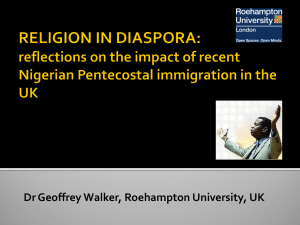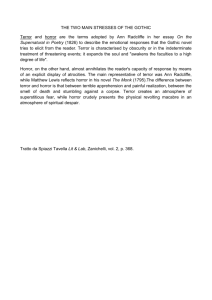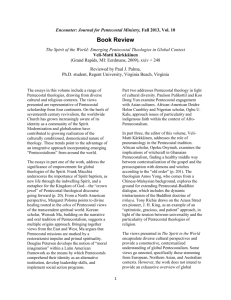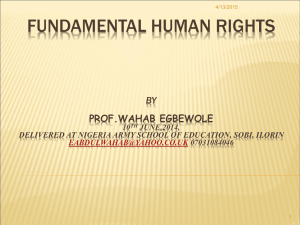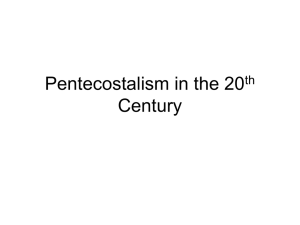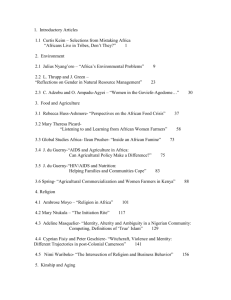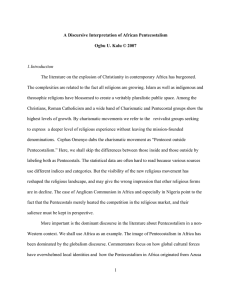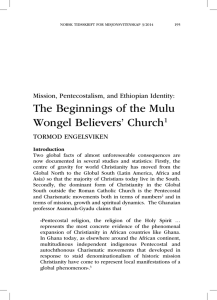Pentecostalism and the Culture of Fear in Contemporary African
advertisement
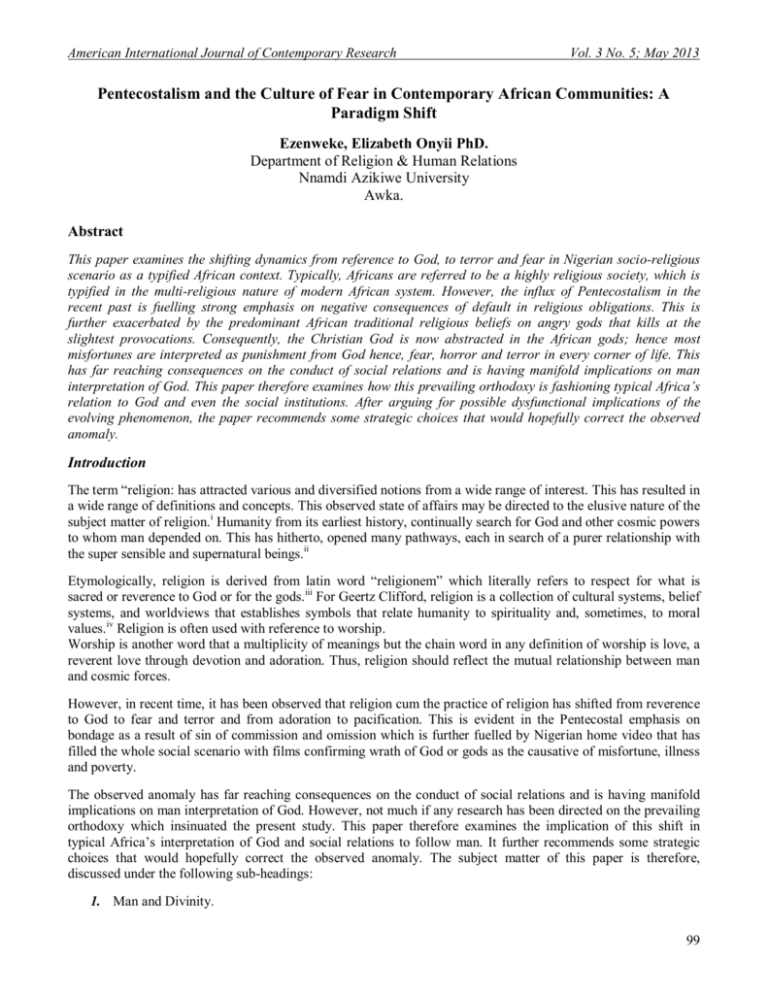
American International Journal of Contemporary Research Vol. 3 No. 5; May 2013 Pentecostalism and the Culture of Fear in Contemporary African Communities: A Paradigm Shift Ezenweke, Elizabeth Onyii PhD. Department of Religion & Human Relations Nnamdi Azikiwe University Awka. Abstract This paper examines the shifting dynamics from reference to God, to terror and fear in Nigerian socio-religious scenario as a typified African context. Typically, Africans are referred to be a highly religious society, which is typified in the multi-religious nature of modern African system. However, the influx of Pentecostalism in the recent past is fuelling strong emphasis on negative consequences of default in religious obligations. This is further exacerbated by the predominant African traditional religious beliefs on angry gods that kills at the slightest provocations. Consequently, the Christian God is now abstracted in the African gods; hence most misfortunes are interpreted as punishment from God hence, fear, horror and terror in every corner of life. This has far reaching consequences on the conduct of social relations and is having manifold implications on man interpretation of God. This paper therefore examines how this prevailing orthodoxy is fashioning typical Africa’s relation to God and even the social institutions. After arguing for possible dysfunctional implications of the evolving phenomenon, the paper recommends some strategic choices that would hopefully correct the observed anomaly. Introduction The term “religion: has attracted various and diversified notions from a wide range of interest. This has resulted in a wide range of definitions and concepts. This observed state of affairs may be directed to the elusive nature of the subject matter of religion.i Humanity from its earliest history, continually search for God and other cosmic powers to whom man depended on. This has hitherto, opened many pathways, each in search of a purer relationship with the super sensible and supernatural beings.ii Etymologically, religion is derived from latin word “religionem” which literally refers to respect for what is sacred or reverence to God or for the gods.iii For Geertz Clifford, religion is a collection of cultural systems, belief systems, and worldviews that establishes symbols that relate humanity to spirituality and, sometimes, to moral values. iv Religion is often used with reference to worship. Worship is another word that a multiplicity of meanings but the chain word in any definition of worship is love, a reverent love through devotion and adoration. Thus, religion should reflect the mutual relationship between man and cosmic forces. However, in recent time, it has been observed that religion cum the practice of religion has shifted from reverence to God to fear and terror and from adoration to pacification. This is evident in the Pentecostal emphasis on bondage as a result of sin of commission and omission which is further fuelled by Nigerian home video that has filled the whole social scenario with films confirming wrath of God or gods as the causative of misfortune, illness and poverty. The observed anomaly has far reaching consequences on the conduct of social relations and is having manifold implications on man interpretation of God. However, not much if any research has been directed on the prevailing orthodoxy which insinuated the present study. This paper therefore examines the implication of this shift in typical Africa’s interpretation of God and social relations to follow man. It further recommends some strategic choices that would hopefully correct the observed anomaly. The subject matter of this paper is therefore, discussed under the following sub-headings: 1. Man and Divinity. 99 © Center for Promoting Ideas, USA www.aijcrnet.com 2. Pentecostalism, Nigerian home Video and the culture of bondage. 3. From Religion of freedom to Religion of Fear. 4. Theological and Social Consequences. 5. Recommends and Conclusion. 1. Man and Divinity Scholars have explained the subject matter of religion in many ways and in various disciplines. As earlier indicated, it has been defined as a collection of cultural systems, belief systems, and worldviews that establishes symbols that relate humanity to spirituality and, sometimes, to moral values. v We shall use this as a point of departure with emphasis on its potentials that relate humanity to spirituality. Invariably, it defines the relationship between God and spiritual beings with humanity. It becomes pertinent to flash back at the status of relationship between man and God with a view to establish if it is of fear or friendship. The justice of God demands that man is punished as well appropriately. That does not undermine that the friendly relationship between the two. Man’s relationship with God both in African Traditional Religion and in Christianity remains one of a close, personal, and satisfying relationship. There is abundance documented evidence too that God enjoys the friendship and fellowship of human beings which made Christianity more of a relationship with Jesus Christ than a religion. This is evident in several Christian texts. For example, Abraham was called the ‘friend of God’ in 2 Chronicles 20:7 and James 2:23. In Genesis 18:17 God said, ‘shall I hide from Abraham what I am about to do?’ In Exodus 33:11 says, the Lord spoke to Moses face to face, as a man speaks with his friend. John 15:9 documents, “As the Father has loved me, so have I loved you. Now continue in my love.” John 15:15, “I have called you friends.” John 15:13, “Greater love has no one than this that he lay down his life for his friends.” In John 10, Jesus makes several statements demonstrating His deep love for us; “I am the good shepherd. The good shepherd lays down his life for the sheep. I know my sheep and my sheep know me and I lay down my life for the sheep.” However, this friendly relationship with God seems to have been replaced with fear and terror by a seemingly over stage of fall and guilt as the causative of every misfortune in the contemporary society. 2. Pentecostalism, Nigerian Home Video and the Culture of Bondage The history of Christianity may be traced from the period of the public ministry of Jesus but the birth of what is known today as Christianity took place at the day of Pentecost, though it was not known by this name until the adherents began to manifest Christ- like behaviour and the people of Antioch called them Christians. vi Pentecostalism may be seen as the second sense of change which is the constant branching off from the mainline churches with minor changes in emphases in respect of the mother group.vii The word ‘Pentecostalism’ is the adverb of Pentecost, a word derived from the Greek word Penthsosth meaning the fiftieth day after the feast of Passover (Lev 23:15f). According to Acts 2, this was the feast which the apostles and other believers gathered to celebrate, and during which event, the Holy Spirit descended on them in the form of tongues of fire (vs. 9-11). This was characterized by physical signs of speaking in tongues. viii Since the terms ‘Pentecostal’ and ‘charismatic’ are associated, there has been an erroneous appropriation of the term ‘charismatic’ by members of the Pentecostal movement, a term which they deny every other Christian. In modern day parlance, the term ‘charismatic’ has come to refer more to the religious frenzy, inspired utterance and the wonder working of some gifted Christians. ix Pentecostalism therefore, which is a major branch of New Religious Movement, xstarted assuming a position of prominence in the religious, socio-economic and psychological lives of the people in the recent times. As time heals wounds so does time often corrupts concepts. Thus, today Pentecostalism has taken a different and seemingly a wider meaning especially in Nigeria. An examination of Pentecostal activities today reveals an appreciation of certain virtues which are not within the context of this work but beneath these virtues, lies a great deal of practices that are at variance with the teaching of Christ. The primary mission of Jesus Christ involves conversion of souls, which centres on morality and peaceful co-existence of all creatures of God. 100 American International Journal of Contemporary Research Vol. 3 No. 5; May 2013 The gospel of Luke chapter 4, verses 18- 19 of The new Jerusalem bible documents that Jesus came to preach the gospel to the poor; heal the broken hearted, set the captives free and to release the downtrodden. In contrary, is a paradigm shift from the known mission of Christ by Pentecostal missions in Nigeria? The motives of today’s Pentecostal missions have therefore raised some dust. It has been alleged that though the Pentecostals claim to worship God, yet, the motive behind these seems to be the spirit of capitalism. xi,xii This has led to the creation of confusions in form of creation of fear, horror and terror in all spheres of the contemporary society on one hand and an avenue for deliverance from bondage on the other hands and each with enormous amount of money. Diagrammatically, Pentecostalism can be represented with a pole; at one end of this pole is the creation of fear, terror and horror while on the other end is the avenue for the release from bondage of fear, horror, demons, illhealth and misfortune. This makes an average African Christian a constant freedom-seeking being. This has hitherto led to the growth of several healing ministries in Africa, Nigeria inclusive and has multifaceted implications. Pentecostals have been therefore, criticized in many ways and against various practices. This may include but not limited to the following: a) Over emphasis on the power of occult and paranormal, practice of family cleansing, exhumation of mystically buried poisonous objects, extraction of poisonous materials from human body, invoking of the spirits of dead persons, separation of mermaid/spiritual spouses and many more. b) Attribution of sickness, barrenness, misfortunes of all sorts and poverty to be demonic or humanly manipulated or as wrath of God due to sin or non payment of appropriate tithe backing it up with Malachi chapter three. c) Attaching demonic presence in every meal and household items. d) Labelling school children as agents of demons that initiate others by sharing drinks or snacks with them. e) Attributing the manufacturing of goods especially weave-on, wigs, and cosmetics of all kinds to mermaid spirits. f) Claims that placentas and umbilical cords are being sold by some hospital workers who are agents to occult members for manufacturing of cosmetics. g) In summary, by attaching demons, occult and God’s wrath to virtually everything one eats or uses thereby creating fear, horror and terror in every corner of social life and establishing homes for healing and deliverance from bondage of God’s wrath and demonic manipulation at a very high cost. These practices have manifolds implications on man’s interpretation of God and social relations. It is under this backdrop that the many people wary about public image of Pentecostalism and its negative and strange elements in the style of its spirituality. xiii The excessive emphases on occult, demonic influence and wrath of angry God is fuelled by the Nigeria home movies which has been noticed even in other African countries and have been commented on by Nigerians and non Nigerians. Gyasi while discussing the Nigeria film invasion in Ghana noted the overwhelming presence or use of occultism in African movies, that Whether a Nigeria film is set in a pre-colonial era or post independenceera, the chances are that one of the actors will go to a fetish shrine. The consultation is either to enable the actor to better his economic and financial circumstances or to kill or spiritually destroy a perceived rival. In ninety-nine percent (99%) of these cases, the actor gets what he wishes and spreads death and destruction around. The impression is created that a particularly difficult case that baffles medical science can be cured by a prayer session. xiv Films should be consciousness- raising tools; their stories are personal mentors that lessen fear or illuminate the love, virtue, and wholeness already present in our lives. xv There is no doubt that the prevailing orthodoxy resonates with the African traditional view that different powers are called up in different situations and that African man cannot be completely understood without his conception of magical or mystical forces that is employed for medical, magical, sorcery and witchcraft purposes,xvi more so, barrenness, poor harvest, sickness can be caused by malignant forces. xvii 101 © Center for Promoting Ideas, USA www.aijcrnet.com Furthermore, Africans believe that all the various ills, misfortunes, sickness, accidents, tragedies, sorrows, dangers and unhappy mysteries, which they encounter and experience, are caused by the use of these mystical powers in the hands of a sorcerer, witch or wizard. Nothing harmful happens by chance, someone causes everything by use of mystical power. xviii Yet, it is blown out of proportion. 3. From the Religion of freedom to the Religion of Fear We shall be guided in this unit by three main questions: Does fear relate to Religion? If so, which type of fear? Is the relationship exploited any religious organizations? There is abundance literature that fears and religion are well related. Many of the myths of the evolution of religions confirm that fear is the survival instinct that led man to search for higher beings. Thus, the idea of religious acknowledgment is as a result of fear of survival, future and its unknown and of death and hereafter. John Shelby Spong demonstrated that Religion is primarily a search for security and not a search for truth. Religion is what we so often use to bank the fires of our anxiety.xixBertrand Russell corroborates that religion is based primarily and mainly upon fear; fear of the mysterious, fear of defeat, fear of death. xx Fear is therefore, an aspect of emotions that goes with instinct. It is often seen as a survival mechanism in response to given stimulus. Religions emerged to answer the question of security in an insecure world, and a feeling of control over the environment where there was little or no control. Then, what type of fear are we talking about? According to the doctrine of the Roman Catholic Church, fear is seen as one of the seven gifts of the Holy Spirit that empowers and facilitates one to live a holy life and to be free from bondage. The Christian bible has several references on the importance of fear as the beginning of wisdom as in Proverb 9:10 or a sign of discipline as in Proverb 15: 33. Furthermore, Psalms 130:3-4 documents: ‘If you, O Lord, kept a record of sins, O Lord, who could stand? But with you there is forgiveness; therefore you are feared.’ However, this fear is not the perpetual fear of being in the net of demons by every step one takes or getting into the trap of an angry God at the slightest provocation or for non payment of full tithe as portray by many Pentecostal missions and Nigerian film industries but is expressed by John Mallon that the "fear" in "fear of the Lord" is often misinterpreted as "servile fear" (the fear of getting in trouble) when it should be understood as "filial fear" (the fear of offending someone whom one loves). xxi Rudolf Otto went further to project what is known as numinous that demonstrate the type of fear one has for the Lord. The ‘fear’ in the fear of the Lord is therefore differentiated from the fear of satanic cum demonic influence. It is rather, the fear of love and affection for the Lord,xxii which empowers one to strive for that which is right and just freely and willingly. As earlier cited, there is servile fear, terror and horror at every corner of the socio-religious life in Africa in general, Nigeria in particular as the Pentecostal missions and Nigerian film industries fill the whole socioreligious scenario of Africa with demons, witches and wizards and by over emphasizing Malachi Chapter three verses 9-10: ‘A curse lies on you because you, this whole nation, try to cheat me. Bring the tithes in full to the treasury, so there is food in my house…. This is often interpreted to be the cause of all misfortunes, sicknesses including HIV/AIDS, economic melt down and lots more. This has resulted in a religion of fear, horror and terror and mass movement from mainline churches to Pentecostal healing grounds in search of deliverance. In his paper, Afe Adogame showed a picture of 300 long buses that conveyed worshippers to a the Redeem’s healing camp in Lagos, Nigeria and this is just one of such deliverance centres.xxiii This has hitherto, multifaceted implications. 4. Theological and Social Consequences The observed anomaly has multifaceted implications but in the context of this paper, we shall briefly highlight the basic theological and social implications on man interpretation of God and on the conduct of social relations. The Social Cognitive Theory and of Self-Efficacy posits that individuals possess self-beliefs that enable them to exercise a measure of control over their thoughts, feelings, and actions, that what people think, believe, and feel affects how they behave. That social factors does not affect human behaviour directly, instead, they affect it to the degree that they influence people's aspirations and perceptions. 102 American International Journal of Contemporary Research Vol. 3 No. 5; May 2013 Ones action is the physical manifestation of ones belief and it is what one hears, sees and knows that one believes. xxiv The increasingly emphasis on fear, horror and terror type of religion affects ones perception of God and social relations among people. In Christianity, God is perceived in several friendly concepts; as loving, caring, forgiving, merciful father but the present disposition portrays God as an angry God that punishes at every provocation or omission of every act. Again, God is described as a powerful creator and owner of the universe and all therein who has all the glory and honour but has been painted as a weak God who has lost all created things to satan and his agents. In summary, religious practices seem to have shifted from reverence, adoration and filial fear of/to God to servile fear, horror and terror ending with actions to pacify the demons. On the other hand, Accusing fingers are in many cases pointed to one/some friends or family members and the aftermath on social relationship are undesirable. Thus, false accusations emanating from false prophecies mesmerize cordial social relationships that were ones enjoyed. This study identified many ‘Pentecostalism-induced’ conflicts in many homes, kindred, communities and social milieu. 5. Recommends and Conclusion The study recommends as follows: 1. Sensitization and re-orientations. The general public needs to be sensitized though mass media and radio adverts on the dangers of these phenomena. This is because; the new religious trend cuts across all socioeconomic, political and religious classes of people. 2. Formation of Non Governmental Organizations (NGOs) to carry the message to the grass root. This is very important because it needs aggressive and constant approach to achieve the desired objectives. 3. Financial rehabilitation of the majority poor populace in the area of study is also recommended, since it was found out from the study that the prevailing economic melt down, unemployment and ignorance were some of the factors fostering these practices. Financial rehabilitation could also be achieved through provision of qualitative education for self reliance and job opportunities. Education has been noted to be a viable means for social mobility The study corroborates the view of Dempster, Klaus and Peterson that: Pentecostals all over the world, but especially in the third world, see the role of healing as good news for the poor and the afflicted. Early 20th century Pentecostal newsletter and periodicals abounded with thousands of testimonies to physical healing, exorcism and deliverances. xxv It is therefore comprehensible that third worlds are characterized by poverty, unemployment, poor medical facilities and illiteracy but to mention a few. It becomes more understandable why Pentecostalism which as well resonate African traditional believes flourish in Africa. The paper therefore concludes that there is an urgent need to tackle the problem of underdevelopment as a tool towards solving the prevailing anomaly. 103 © Center for Promoting Ideas, USA i www.aijcrnet.com Ikeng-Metuh, E. God and Man in African Religions (London: Geoffrey Chapman, 1981) Madu, Jude Emeka. Honest to African cultural heritage (Onitsha: Coskan, 2004). iii Hypography Science Forums: Fear and Religion http://scienceforums.com/topic/5794-fear-and-religion iv Hypography Science Forums: Fear and Religion http://scienceforums.com/topic/5794-fear-and-religion. v Ibid vi Falaiye, E. A. (2005). Pentecostalism in the light of Acts chapter 1 verse 8. In A.G.Nnamani (Ed.). The new religious movement: Pentecostalism in perspective. (Benin City: Ava, 2005), 29-44 vii Oguejiofor,Josephat O. Pitfalls in our Pentecostalism: A presidential address. In A.G. Nnamani (Eds). The new religious movement: Pentecostalism in perspective (Benin City: Ava), 1-10. viii Sullivan, F. Charism and charismatic renewal:A biblical and theological study(Michigan: Servants,1982). ix Nwachukwu, M.The Pentecostal phenomenon in the church and the Corinthian hermeneutic (1 cor.12 – 14). In A.G. Nnamani (Eds). The new religious movement: Pentecostalism in perspective (pp. 15 – 28). (Benin City: Ava, 2007), 15-28 x Shorter, A. & Njiru, J. N.New religious movements in Africa.(Nairobi: Pauline, 2001). xi Ogunnmodede, F. Pentecostalism and materialism: An X-ray of the economic determinants within the new religious movements in Nigeria. A paper presented at the 21st Annual Conference of the Catholic Theological Association of Nigeria, (Ekpoma, Edo state, Nigeria, from 18-21st day of May, 2006. xii Obiora, F.O. Divine deceit: Business in religion. (Enugu: Optimal, 1995) xiii Elue, M. O.The challenge of Pentecostalism in the Nigerian church. In A. G. Nnamani (Ed.). The new religious movement: Pentecostalism in perspective (Benin City: Ava, 2006), 70 -89. xiv Gyasi, I. K.The Nigeria film invasion, Ghanaian Chronicle of 22/03/04. xv Sinatar, M. Reel power: Spiritual growth through film. (Liguria, MO: Triumph,1993), 25 xvi Ogbajie, C.The Impact of Christianity on the Igbo Religion and Culture (Umuahia:Ark, 1995),56 xvii Nwala, T. U. Igbo Philosophy (Nigeria: Lantern, 1985) xviii Mbiti, John S. Concepts of God in Africa (Nairobi: SPCK, 1970), 200 xix John Shelby Spong xx Bertrand Russell xxi John Mallon Mallon, John. The Primacy of Jesus, the Primacy of Love:the Vatican magazine (April 2006). http://www.insidethevatican.com/articles/status-ecclesiae/status-ecclesiae-apr-2006.htm. xxii Holy Ghost. Catholic Encyclopedia. 1910. http://www.newadvent.org/cathen/07409a.htm. xxiii Afe Adogame Questioning the good things in life: The Public face of new African Christianity. A paper presented at the Joint Conference of Academic Societies in the field of Religion and Theology, University of Kwa-Zulu Natal, Pietermaritzburg campus, South Africa, 18- 22 June, 2012. xxiv Bandura, A. Self – Efficacy: Towards a unifying theory of behavioral change. Psychological Review, 84, 191215. xxv Dempster, M.A; Klaus, B.O. & Peterson. D. Called and empowered: Global mission in Pentecostal perspective (Peabody: Hendrickson, 1991), 206. ii 104
